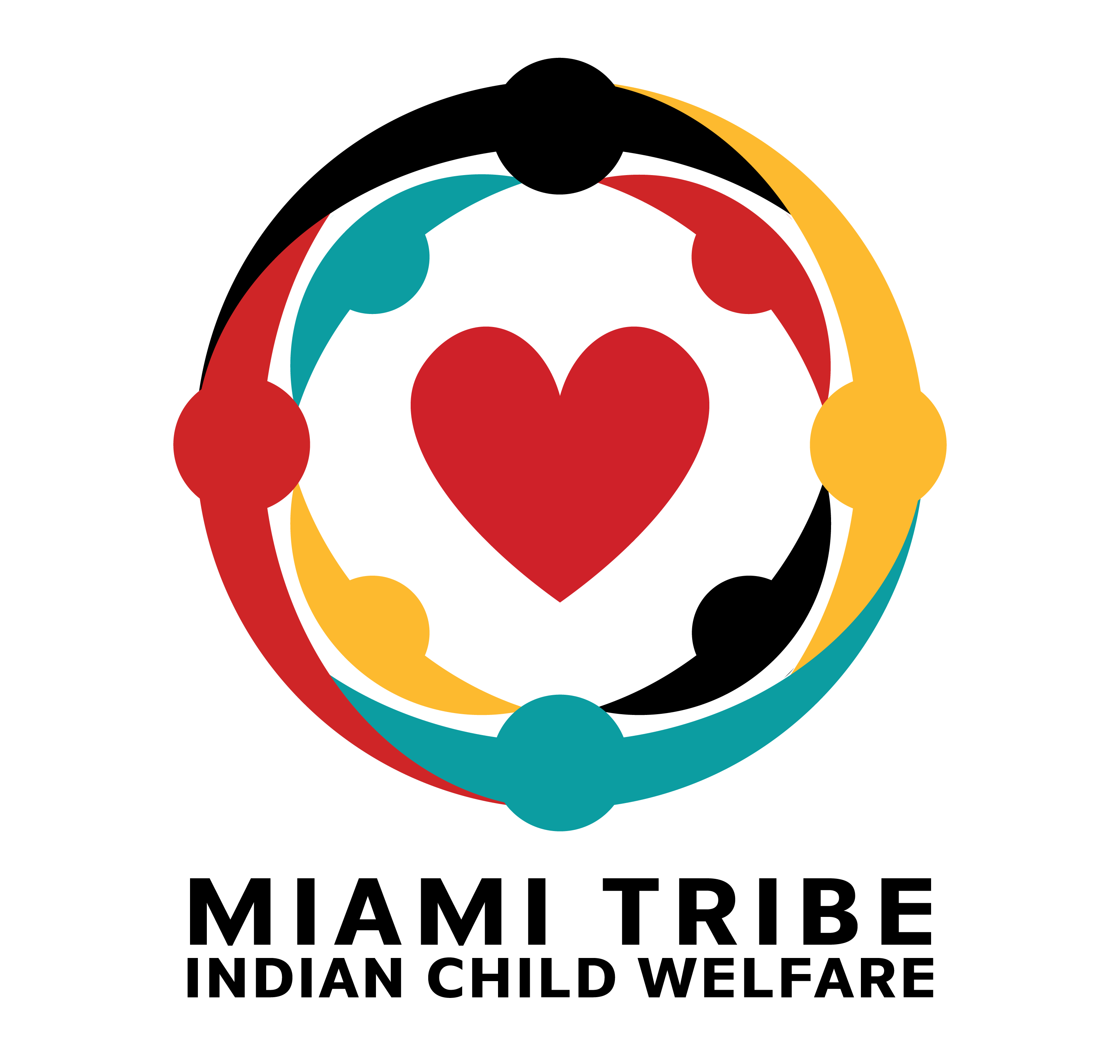
How to Contact ICW
For Inquiries and Referrals,
Email: mtokicw@miamination.com
Corinna Evans,
Indian Child Welfare Coordinator
Email: cevans@miamination.com
Cell Phone: (918) 325-9078
Office Phone: (918) 541-1300
Trina Grayson,
Assistant Indian Child Welfare Coordinator
Email: tgrayson@miamination.com
Cell Phone: (918) 961-1395
Office Phone: (918) 541-1300
Office Fax: (918) 515-6051
Helpful Resources
Mission Statement
"The Miami Tribe of Oklahoma Indian Child Welfare Department is committed to providing the highest level of services to the tribal families and children who happen to be involved in an “at risk” situation or involved with a state child welfare agency referral or case. The MTOK ICW Department manages cases that involve children in tribal custody and that are actively involved in state child welfare cases."
Report Child Abuse
A report can be made to any county office of the Department of Human Services. Child abuse can also be reported 24 hours per day, seven days per week by calling the statewide child abuse hotline. Statewide Child Abuse Hotline: (800) 522-3511
If you are tribal and live on Miami Tribal Reservation land, or observe child abuse or neglect of an Indian Child on Miami Tribal Reservation land, please contact the Miami Tribe of Oklahoma ICW Department at mtokicw@miamination.com or call (918) 541-1381.
Vision of the ICW
The Miami Tribe of Oklahoma’s Children and Family Services Department aims to promote and preserve the well-being of all Miami Tribal Families and Children. The Miami Tribe of Oklahoma’s Indian Child Welfare Department places a special emphasis on children and families determined to be at risk for child welfare intervention – focusing on early intervention, trauma-informed practice, and the promotion of foster and adoptive families. The MTOK ICW Dept. provides resources, support, and case management services to enrolled and eligible tribal members nationwide involved in an ICWA case.
The Indian Child Welfare program is funded by federal funds known as Title IV-B part I and part II, and the Family First Transition Act. Each grant has specific regulations and guidelines for services to be provided. There is no service for the Miami Tribe Indian Child Welfare program. The only stipulation for services requires that the child/children involved be eligible for enrollment or are already an enrolled member of the Miami Tribe of Oklahoma. There is no application process to receive services from the Indian Child Welfare Program. The MTOK ICW Department intervenes and monitors state child welfare cases involving tribal children regardless of adjudication status or substantiation of abuse/neglect allegations. In addition to monitoring the state cases involving Miami Tribal children, the MTOK ICW program offers resource referrals and support to the involved tribal children and families.
The MTIK ICW program also assesses, on a case-by-case basis, the need for transference of these state cases to the Miami Tribal court. Transference is dependent on several factors, including, but not limited to, proximity, need for intervention, lack of ICWA compliance in state proceedings, preferential placement not being adhered to, request for transference by tribal family, etc. In the event of a transference to tribal court, the MTOK ICW Department then serves as the full-time case management entity for the case.
Programs from ICW:
The Promoting Safe and Stable Families Program (PSSF) is a child welfare prevention program that aims to assist “at-risk” tribal families and reduce the number of child welfare cases involving tribal children.
In addition to the ICWA notices used to identify child welfare involved tribal families and children, the Miami Tribe of Oklahoma ICW department works with area agencies, tribal services, and self-referrals (applications) to identify families “at-risk” or in crisis that are in need of PSSF Prevention program services. Some crisis situations include families facing unemployment, substance abuse, recovering from the impacts of COVID-19, the death of a parent, etc. When a referral is received for prevention services, the ICW department contacts the family to conduct a further assessment to help in the development of a prevention case plan. These case plans focus heavily on areas of stability: employment, substance use, transportation, education, food/clothing, and housing. Other areas of focus when developing these case plans include physical health, mental health, social supports, dental health, utilities, childcare, etc. Using this evaluation/service plan development, the ICW Department makes appropriate resource provisions and referrals.
Like ICW cases, PSSF Prevention cases are treated from a trauma-informed, client-centered perspective. All prevention case plans/service plans are developed collaboratively with the families to ensure the goals are realistic and attainable.
If you or your family believe that you may qualify for the PSSF Prevention Program, please complete an application and submit the application to the following email address:
Applications will be reviewed on a case-by-case basis to determine eligibility and program applicability.
Promoting Safe and Stable Families Program Application
Every year, a quarter of a million children come into foster care in this country. Many of them will be placed in group homes or other group residential settings because there are simply not enough foster families to care for all of the children. In the state of Oklahoma, 65% of native children are in non-ICWA-compliant homes.
Foster parents play a critical role in helping children heal. They show children stability and teach them life lessons that last a lifetime and potentially impact future generations. Miami Tribe ICW is looking for individuals that are compassionate, understanding, and committed to playing a key role in children’s lives. Every child deserves a family and the opportunity to preserve their culture in an ICWA-compliant home.
If you are interested in becoming a foster parent or have questions, please call the MTOK ICW Department at (918) 541-1300
You can download an application and submit it to the following email address:
The Miami Tribe of Oklahoma PSSF Car Seat Program is a first-come, first-served program, with Miami Tribe of Oklahoma members receiving preference.
Car seats will be given only to children 8 years old and younger. Must provide a copy of the birth certificate of the child. The child or parent must be an enrolled member of a federally recognized tribe, if the child does not have a membership/CDIB card, the parent must supply their membership CDIB card along with a copy of the birth certificate or hospital birth record for the child/children.
If you are pregnant, you will be eligible to apply; you must provide a proof of pregnancy letter from your physician with an estimated due date.
If you have court custody of a child (temporary or permanent), you must provide official documentation of guardianship or proof of placement from Tribal Court or DHS.
You can download an application and submit it to the following email address:
The Maimi Tribe of Oklahoma PSSF Diaper Distribution Program is a first-come first served program; with Miami Tribe of Oklahoma members receiving preference.
Diapers/Pullups will be given only to children 3 years old and younger; You must provide a copy of the birth certificate of the child.
The child or parent must be an enrolled member of a federally recognized tribe, if the child does not have a membership/CDIB-the parent must supply their membership/CDIB along with a copy of the birth certificate or hospital birth record for children.
If you are pregnant, you will be eligible to apply; you must provide a proof of pregnancy letter from your physician with an estimated due date.
If you have court custody of a child (temporary or permanent) you must provide official documentation of guardianship or proof of placement from Tribal Court or DHS.
You can download an application and submit to the following email address:
Diaper Distribution Program Application
Newborn Care Package Application
